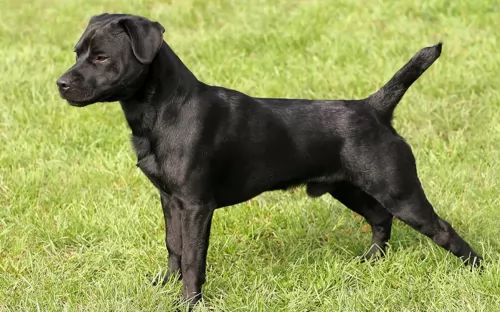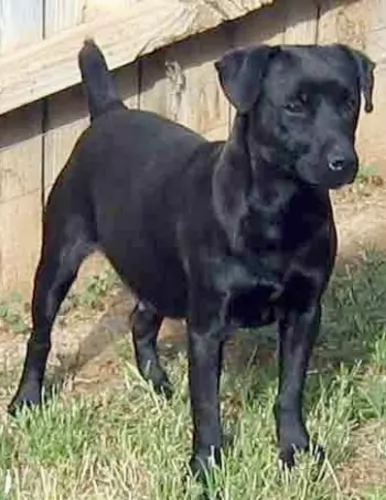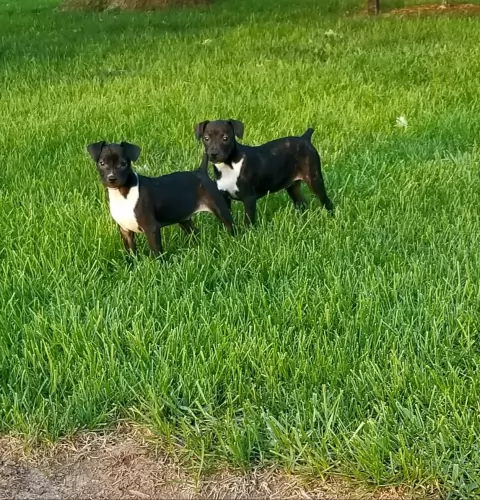 Patterdale Terrier is originated from United Kingdom but Havapoo is originated from United States. Both Patterdale Terrier and Havapoo are having almost same height. Both Patterdale Terrier and Havapoo are having almost same weight. Both Patterdale Terrier and Havapoo has almost same life span. Both Patterdale Terrier and Havapoo has almost same litter size. Patterdale Terrier requires Low Maintenance. But Havapoo requires Moderate Maintenance
Patterdale Terrier is originated from United Kingdom but Havapoo is originated from United States. Both Patterdale Terrier and Havapoo are having almost same height. Both Patterdale Terrier and Havapoo are having almost same weight. Both Patterdale Terrier and Havapoo has almost same life span. Both Patterdale Terrier and Havapoo has almost same litter size. Patterdale Terrier requires Low Maintenance. But Havapoo requires Moderate Maintenance
Basic Information
undefined
United Kingdom
United States
Life Span:
11 - 13 Years
10 - 14 Years
Other Names:
The Patterdale, Black Fell Terrier
Poovanese, Island Mini Doodle, Havadoodle, Havanesepoo, Havanesedoodle
Colors Available:
black and tan or chocolate, liver, bronze, Red, sometimes brindle. , black
brown, grey, tan, white, black
Coat:
Smooth, broken or rough
soft, hypoallergenic fur
Shedding:
Moderate
Moderate
Temperament:
Affectionate, Alert, Cheerful, Courageous, Curious, Energetic, Friendly, Independent, Intelligent, Lively, Loving, Loyal, Outgoing, Protective, Responsive, Social, Stubborn, Territorial
Affectionate, Energetic, Friendly, Gentle, Intelligent, Loving, Outgoing, Playful
Grooming:
Low Maintenance
Moderate Maintenance
New Owners Friendly:
Yes
Yes
History
 The Patterdale was developed in England,with his origins being linked to an early breeder with the name Joe Bowman.
The Patterdale was developed in England,with his origins being linked to an early breeder with the name Joe Bowman.
They were sought after for their prowess at guarding sheep from foxes. The dog was recognized by the United Kennel Club in 1995. It is believed the dog is descended from the Northern terrier breeds and can be traced far back.
The Havapoo is usually a cross with a miniature Poodle and a Havanese but other poodle sizes such as the toy can be used. This is a fairly new cross breed just getting the attention of the American public. The result is a friendly, small dog. They have a striking appearance and lovable personality. They are easy to train and very smart. Not much is know about their heritage except that they were developed in the United States sometime in the past 30 years. Given the long history of the parental breeds, you can count on the quality and beauty of the Havapoo.
Description
 The Patterdale Terrier is a small sized dog that stands at between 25 and 40 cm in height and weighs 5 to 7kg.
The Patterdale Terrier is a small sized dog that stands at between 25 and 40 cm in height and weighs 5 to 7kg.
The coat of the dog can be smooth, broken or rough, but all coats are double and weatherproof. Colors include red, liver, black, bronze, black and tan or chocolate and sometimes brindle. The ears are floppy and medium length and the tail is also medium length and held high, curving slightly. It used to be docked and then ¼ to 1/3 of the tail was removed.
Temperament:
The Patterdale Terrier is small but he is bold and confident and very energetic. He will certainly need to be in a household where the family members are active, busy people. Because he is strong-willed he will benefit from training and socialization which will make him obedient and able to behave well in different situations.
The look of the Havapoo is unpredictable in first generation mixes as the puppies can appear like either of the parents. Most however have carried on the facial features of the Havanese. They usually have soft coats with hypoallergenic fur that comes in brown, black, grey, white and tan.
The white dogs tend to be deaf or perhaps even blind.
They are really good looking dogs whichever parent they favor.
Characteristics
 Intelligent, courageous and feisty, the Patterdale Terrier is a dog that will get on well with everyone in the house. Those who are active and outdoor types will be the best kind of dog owners for this active, energetic dog.
Intelligent, courageous and feisty, the Patterdale Terrier is a dog that will get on well with everyone in the house. Those who are active and outdoor types will be the best kind of dog owners for this active, energetic dog.
The Patterdale is confident and strong willed and will do superbly well with some training and socialization. With lots of love and care, your Patterdale Terrier can make you an excellent family pet and companion.
1Children friendliness yes but monitor their interaction so the dog does not get hurt.
2.Special talents highly intelligent and love to run
3.Adaptability Home or apartment is fine but would love a fenced yard to run in.
4.Learning ability very high smart and loves to learn
Health Problems
 The good news is that terriers have few health problems and they can live to a ripe age. Just like other dogs, they can also battle with some of the common dog ailments there are.
The good news is that terriers have few health problems and they can live to a ripe age. Just like other dogs, they can also battle with some of the common dog ailments there are.
Allergies:
Most allergens are foods, medicines or insects and exposure to the allergen can cause an over-reaction. In a dog, the most common symptom associated with allergies is itching of the skin. It can drive your pet mad as he licks and bites his skin. The symptoms of allergies can involve the respiratory system and he will have coughing and sneezing or even a discharge from the eyes.
Glaucoma:
Your Patterdales can also develop cataracts and glaucoma – two kinds of eye diseases. Glaucoma can unfortunately lead to blindness but something can be done if you recognize the signs. There are 2 main types of canine glaucoma, characterized by pressure inside the eye which can do damage to the retina and optic nerve – primary- and secondary glaucoma. Your vet will try to determine whether your pet has primary or secondary glaucoma to determine treatment.
Even though first generation mixes have no genetic health issues. There are however some issues they are prone to:
• Deafness - primarily in the white dogs, nothing can be done for it.
• Cataracts – can lead to blindness
• Hypothyroidism – can be medicated
• Hip Dysplasia – can lead to lameness
• Patellar Luxation – can lead to lameness
Caring The Pet
Exercise:
 Your Patterdale Terrier has a lot of energy, so as a responsible dog owner, you will need to see that he is exercised properly. This will include a walk every day as well as spending time throwing balls or a frisbee for him. He is a working breed and has been used to being mentally and physically stimulated.
Your Patterdale Terrier has a lot of energy, so as a responsible dog owner, you will need to see that he is exercised properly. This will include a walk every day as well as spending time throwing balls or a frisbee for him. He is a working breed and has been used to being mentally and physically stimulated.
Grooming:
The Patterdale Terrier isn’t a high maintenance dog and his coat will simply require a brush twice a week. Your pet can’t tell you about any pain he is experiencing so you will need to watch his body language.
Dogs can easily pick up an ear infection and this can be very painful. When you brush your pet, check inside his ears for signs of redness and discharge and check inside his mouth to see if you can spot any rotten teeth. Bad teeth can wreak havoc on his health. Keep the nails trimmed.
Diet:
If you intend feeding your pet commercially manufactured food, good and well because it is a convenient way to feed your pet, but make sure its a quality food. This will ensure your dog is getting in the right amount of vitamins and minerals.
To vary his diet just a bit, provide him with some home-made food such as boiled chicken, brown rice or pasta, and some wholesome vegetables such as carrots, spinach and sweet potato. Dogs love the simplicity and nutritional value of food like this, and they don't have to worry about getting a stomach ache from strange foods. Try and include some raw meat into the kibble from time to time as well.
Never leave your Paatterdale Terrier without a constant supply of fresh cool water.
1Feeding the puppy – feed a high quality puppy food for small or toy dogs. Feed 3-4 times a day a total or 1 cup.
2.Feeding the adult - feed a high quality puppy food for small or toy dogs. Feed 3-4 times a day a total of 2 cups
3.Points for Good Health – overall good health
4. Games and Exercises – needs some moderate exercise and would love a fenced yard to run in. Will play fetch and some are good at agility.
Comparison with other breeds
- Patterdale Terrier vs English Bulldog - Breed Comparison
- Patterdale Terrier vs German Shepherd - Breed Comparison
- Patterdale Terrier vs Golden Retriever - Breed Comparison
- Patterdale Terrier vs Labrador Retriever - Breed Comparison
- Patterdale Terrier vs West Highland White Terrier - Breed Comparison
- Patterdale Terrier vs French Bulldog - Breed Comparison
- Patterdale Terrier vs Beagle - Breed Comparison
- Patterdale Terrier vs Yorkshire Terrier - Breed Comparison
- Patterdale Terrier vs Poodle - Breed Comparison
- Patterdale Terrier vs Rottweiler - Breed Comparison
- Patterdale Terrier vs Boxer - Breed Comparison
- Patterdale Terrier vs English Pointer - Breed Comparison
- Patterdale Terrier vs Siberian Husky - Breed Comparison
- Patterdale Terrier vs Doberman Pinscher - Breed Comparison
- Patterdale Terrier vs American Bully - Breed Comparison
- Patterdale Terrier vs Abruzzenhund - Breed Comparison
- Patterdale Terrier vs Affenpinscher - Breed Comparison
- Patterdale Terrier vs Afghan Hound - Breed Comparison
- Patterdale Terrier vs Aidi - Breed Comparison
- Patterdale Terrier vs Airedale Terrier - Breed Comparison
- Patterdale Terrier vs Akbash Dog - Breed Comparison
- Patterdale Terrier vs Akita - Breed Comparison
- Patterdale Terrier vs Africanis - Breed Comparison
- Patterdale Terrier vs Askal - Breed Comparison
- Patterdale Terrier vs Atlas Terrier - Breed Comparison
- Havapoo vs English Bulldog - Breed Comparison
- Havapoo vs German Shepherd - Breed Comparison
- Havapoo vs Golden Retriever - Breed Comparison
- Havapoo vs Labrador Retriever - Breed Comparison
- Havapoo vs West Highland White Terrier - Breed Comparison
- Havapoo vs French Bulldog - Breed Comparison
- Havapoo vs Beagle - Breed Comparison
- Havapoo vs Yorkshire Terrier - Breed Comparison
- Havapoo vs Poodle - Breed Comparison
- Havapoo vs Rottweiler - Breed Comparison
- Havapoo vs Boxer - Breed Comparison
- Havapoo vs English Pointer - Breed Comparison
- Havapoo vs Siberian Husky - Breed Comparison
- Havapoo vs Doberman Pinscher - Breed Comparison
- Havapoo vs American Bully - Breed Comparison
- Havapoo vs Abruzzenhund - Breed Comparison
- Havapoo vs Affenpinscher - Breed Comparison
- Havapoo vs Afghan Hound - Breed Comparison
- Havapoo vs Aidi - Breed Comparison
- Havapoo vs Airedale Terrier - Breed Comparison
- Havapoo vs Akbash Dog - Breed Comparison
- Havapoo vs Akita - Breed Comparison
- Havapoo vs Africanis - Breed Comparison
- Havapoo vs Askal - Breed Comparison
- Havapoo vs Atlas Terrier - Breed Comparison
 Petzlover
Petzlover Patterdale Terrier is originated from United Kingdom but Havapoo is originated from United States. Both Patterdale Terrier and Havapoo are having almost same height. Both Patterdale Terrier and Havapoo are having almost same weight. Both Patterdale Terrier and Havapoo has almost same life span. Both Patterdale Terrier and Havapoo has almost same litter size. Patterdale Terrier requires Low Maintenance. But Havapoo requires Moderate Maintenance
Patterdale Terrier is originated from United Kingdom but Havapoo is originated from United States. Both Patterdale Terrier and Havapoo are having almost same height. Both Patterdale Terrier and Havapoo are having almost same weight. Both Patterdale Terrier and Havapoo has almost same life span. Both Patterdale Terrier and Havapoo has almost same litter size. Patterdale Terrier requires Low Maintenance. But Havapoo requires Moderate Maintenance The Patterdale was developed in England,with his origins being linked to an early breeder with the name Joe Bowman.
The Patterdale was developed in England,with his origins being linked to an early breeder with the name Joe Bowman. The Patterdale Terrier is a small sized dog that stands at between 25 and 40 cm in height and weighs 5 to 7kg.
The Patterdale Terrier is a small sized dog that stands at between 25 and 40 cm in height and weighs 5 to 7kg. Intelligent, courageous and feisty, the Patterdale Terrier is a dog that will get on well with everyone in the house. Those who are active and outdoor types will be the best kind of dog owners for this active, energetic dog.
Intelligent, courageous and feisty, the Patterdale Terrier is a dog that will get on well with everyone in the house. Those who are active and outdoor types will be the best kind of dog owners for this active, energetic dog. The good news is that terriers have few health problems and they can live to a ripe age. Just like other dogs, they can also battle with some of the common dog ailments there are.
The good news is that terriers have few health problems and they can live to a ripe age. Just like other dogs, they can also battle with some of the common dog ailments there are. Your Patterdale Terrier has a lot of energy, so as a responsible dog owner, you will need to see that he is exercised properly. This will include a walk every day as well as spending time throwing balls or a frisbee for him. He is a working breed and has been used to being mentally and physically stimulated.
Your Patterdale Terrier has a lot of energy, so as a responsible dog owner, you will need to see that he is exercised properly. This will include a walk every day as well as spending time throwing balls or a frisbee for him. He is a working breed and has been used to being mentally and physically stimulated.